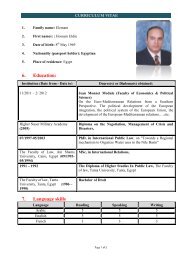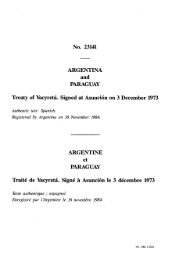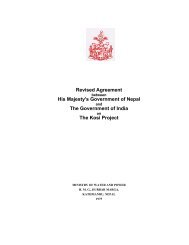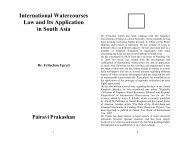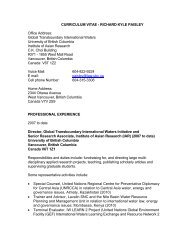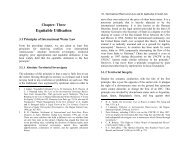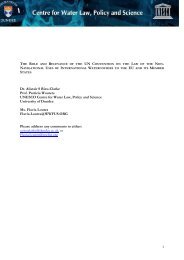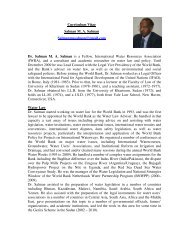Upreti, Trilochan, International Watercourses Law and Its Application ...
Upreti, Trilochan, International Watercourses Law and Its Application ...
Upreti, Trilochan, International Watercourses Law and Its Application ...
You also want an ePaper? Increase the reach of your titles
YUMPU automatically turns print PDFs into web optimized ePapers that Google loves.
18 / <strong>International</strong> <strong>Watercourses</strong> <strong>Law</strong> <strong>and</strong> <strong>Its</strong> <strong>Application</strong> in South Asia Development <strong>and</strong> Codification of <strong>International</strong> <strong>Watercourses</strong> <strong>Law</strong> / 19In the light of water as essential requirement for people, thedifficulty of access to water <strong>and</strong> the problems associated withits scarcity, a very careful <strong>and</strong> prudent resolution of the issue isof the utmost need in order to maintain smooth relationsbetween riparian states. As has been analysed, the issue by itscomplex nature requires a prudent <strong>and</strong> balanced resolutionreconciling the diverse interests of contestant states. 52.2 Sources of <strong>International</strong> <strong>Watercourses</strong> <strong>Law</strong>2.2.1 Earliest Stage of Development of IWCThe quantum of water is the same as it was three billion yearsago. 6 At the same time, its uses have gone up to such a pointthat to keep a balance between dem<strong>and</strong> <strong>and</strong> supply has becomea formidable task. Furthermore, such waters have also becomestrategic resources for several states in order to attain the socioeconomic<strong>and</strong> political aspirations of their people as well as thebest tool for bargaining with other riparian states. The otherreason, however, for the huge increase in the use of the watersis the rising prosperity in human lives along with the rapidpopulation growth. This exacerbates the problem further, <strong>and</strong>the consequence is obvious, more stress on water supply.As a result of misuse <strong>and</strong> overuse of water, the quantityavailable as well as the quality has been found to be decreasingin several parts of the world. Consequently, it has given birth toseveral conflicts. Earlier development in the area by the courts,tribunals, bilateral as well as multilateral conventions, customs,(2) This provision shall not prejudice the power of the court to decidea case ex aequo et bono, if the parties agree thereon.”5 R. Clarke, Water: The <strong>International</strong> Crisis, London: Earthscan Pub.,1991, p. 92.6 A. Dixit, Basic Water Science, Kathm<strong>and</strong>u: Nepal Water ConservationFoundation, 2002, p. 6: “the total supply [of water] neither grows nordiminishes. It is believed to be almost precisely the same now as it was3 billion years ago. Endlessly recycled, water is used, disposed of,purified <strong>and</strong> used again.”agreements, <strong>and</strong> writings of the publicists greatly inspired <strong>and</strong>influenced the resolution of most of the conflicts. Ultimately,on numerous occasions, disputes were resolved amicably <strong>and</strong>peacefully by accommodating divergent interests, but some ofthem remain unresolved. 7 Resolution of the disputes wascarried out in accordance with the concepts of co-operation <strong>and</strong>good neighbourly relations, based on equity, which were laterlargely followed by the other states in their bilateral relations<strong>and</strong> appreciated by the international community. Efforts will beconcentrated on assessing <strong>and</strong> evaluating the far-reachingconsequence of these achievements <strong>and</strong> their implications forthe development of IWL.As stated earlier, scientific innovation has enabled humans toundertake water diversion to far away places as exemplified inthe western part of the United States, Australia, the then SovietUnion, Israel <strong>and</strong> several other parts of the world wheregr<strong>and</strong>iose diversion works have been undertaken. 8 In theMiddle-East (ME), a complex <strong>and</strong> huge project, 'the peacepipeline' has been proposed, which is supposed to deliver waterfrom Turkey to all Middle-Eastern countries including Israel.Apart from this, in Libya, there is an ambitious plan forcollecting <strong>and</strong> diverting water in a pipeline, also called a 'greatman-made river', which stretches from deep aquifers, so called“fossil” water. This is intended to augment the seriouslydepleted groundwater supplies in the coastal region, bybringing water from the hundreds of desert wells at Tazirbu <strong>and</strong>Saria. 9 Nevertheless, with such new developments <strong>and</strong>innovations, the formulation of particular rules that could7 C. B. Bourne, "The Primacy of the Principle of Equitable Utilization inthe 1997 Watercourse Convention" in XXXV CYBIL, (1997) pp. 215-231.8 P. Wouters (ed), <strong>International</strong> Water <strong>Law</strong>: Selected Writtings ofProfessor Charlse. B. Bourne, the Hague: Kluwer <strong>Law</strong>, 1997, pp. 221-241.9 Supra note 2, p. 10.



